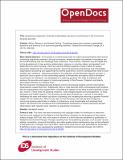| dc.contributor.author | White, R | |
| dc.contributor.author | Sterling, Andrew | |
| dc.coverage.spatial | UK | en_GB |
| dc.date.accessioned | 2014-04-11T17:13:24Z | |
| dc.date.available | 2014-04-11T17:13:24Z | |
| dc.date.issued | 2013-10-01 | |
| dc.identifier.citation | White, Rebecca, and Andrew Stirling. "Sustaining trajectories towards sustainability: dynamics and diversity in uk communal growing activities." Global Environmental Change 23.5 (2013): 838-846. | en_GB |
| dc.identifier.issn | 1932-6203 | |
| dc.identifier.uri | https://opendocs.ids.ac.uk/opendocs/handle/20.500.12413/3780 | |
| dc.description.abstract | Civil society is a critical arena both for exploring Sustainability itself and for sustaining trajectories towards it through innovation, experimentation and debate. Innovations can be mould breaking and can challenge local institutions. Concurrently, initiatives may be fragile due to the development of new working relationships, reliance on voluntary labour and goodwill, and dependence on grant funding. Here we examine different aspects of what it takes to sustain grassroots trajectories for ‘communal growing’, given the pressures that groups and intermediary organisations practicing and supporting this activity experience, and the consequential need to build qualities like ‘resilience’. Attending carefully to the definition of this otherwise slippery concept, a particular focus is given to how contrasting aspects of temporality and agency lead to divergent constructions of ‘resilience’ and strategies for sustaining growing. We draw on fieldwork that explores the practice and support of communal growing in East Sussex, England, and directly associated activities at a national level.
We find important interdependencies between communal growing projects and the intermediary organisations supporting them. Additionally there is huge diversity within and between both projects and the organisations that support them, including with respect to the ends to which growing is seen as a means. These ends link growing initiatives - both antagonistically and synergistically - to food, education and health systems. This diversity can be seen positively as: a source of innovation; facilitating the open and bottom up nature of growing; and, enabling the securing of greater financial support for the endeavour. What is less clear is how this plays into framing and configuring communal growing specifically in relation to achieving a more Sustainable and localised food system. We discuss the conceptual and methodological implications of these empirically derived observations with regards future research on grassroots innovations. | en_GB |
| dc.description.sponsorship | ESRC | en_GB |
| dc.language.iso | en | en_GB |
| dc.publisher | Elsevier | en_GB |
| dc.rights | NOTICE: this is the author’s version of a work that was accepted for publication in Global Environmental Change. Changes resulting from the publishing process, such as peer review, editing, corrections, structural formatting, and other quality control mechanisms may not be reflected in this document. Changes may have been made to this work since it was submitted for publication. A definitive version was subsequently published in Global Environmental Change, 23.5 (2013) http://dx.doi.org/10.1016/j.gloenvcha.2013.06.004 | en_GB |
| dc.rights.uri | http://www.ids.ac.uk/files/dmfile/IDSOpenDocsStandardTermsOfUse.pdf | en_GB |
| dc.title | Sustaining trajectories towards Sustainability: Dynamics and diversity in UK communal growing activities | en_GB |
| dc.type | Article | en_GB |
| dc.rights.holder | Global Environmental Change (Elsevier) | en_GB |
| dc.identifier.externaluri | http://dx.doi.org/10.1016/j.gloenvcha.2013.06.004 | en_GB |
| dc.identifier.team | Knowledge Technology and Society | en_GB |

